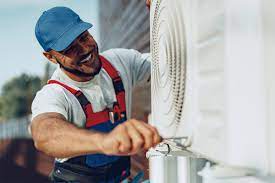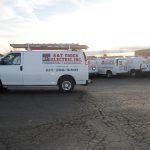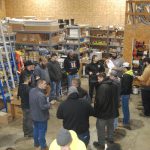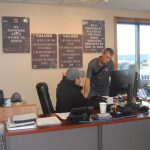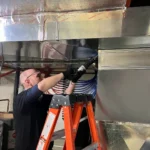Maintaining a comfortable home environment means having a reliable heating and air conditioning system. When your HVAC system encounters problems, repairs can feel daunting. However, understanding how to address common issues safely can save time and money while ensuring your system operates efficiently.
Understanding Your HVAC System
To repair your HVAC system safely, it’s vital to understand its basic components and functions.
- Heating System
- Furnace: Heats air through gas, oil, or electricity and distributes it via ductwork.
- Heat Pump: Extracts heat from the outside air and transfers it indoors.
- Air Conditioning System
- Compressor and Refrigerant: Work together to cool air by removing heat.
- Evaporator Coils: Absorb heat and humidity from indoor air.
- Blower Motor: Distributes cooled or heated air throughout your home.
- Shared Components
- Thermostat: Controls the system’s operation and temperature settings.
- Air Ducts: Transport heated or cooled air.
- Filters: Trap dust and debris, ensuring clean airflow.
Understanding these components helps identify where problems may arise and how to address them safely.
Common HVAC Problems and Safe Solutions
1. Airflow Issues
Restricted airflow is a common problem that reduces efficiency and increases energy consumption.
- Causes:
- Dirty air filters
- Blocked vents or ductwork
- Faulty blower motor
- Safe Repair Steps:
- Turn off the system.
- Replace or clean air filters every 1–3 months.
- Inspect vents and remove obstructions.
- Check ductwork for leaks and seal them with HVAC tape.
2. Uneven Heating or Cooling
If some rooms feel too hot or cold, your system may not be distributing air evenly.
- Causes:
- Incorrect thermostat settings
- Duct leaks or blockages
- Poor insulation
- Safe Repair Steps:
- Adjust thermostat settings and ensure it’s set to the correct mode.
- Seal any visible leaks in ductwork.
- Inspect insulation in problem areas and add more if necessary.
3. System Won’t Turn On
A non-functional HVAC system can make your home uncomfortable quickly.
- Causes:
- Tripped circuit breakers
- Faulty thermostat
- Electrical issues
- Safe Repair Steps:
- Check the breaker box and reset any tripped switches.
- Replace thermostat batteries or recalibrate it.
- If electrical issues persist, contact a licensed professional.
4. Strange Noises
Unusual sounds often indicate mechanical problems that require immediate attention.
- Causes:
- Loose or worn-out components
- Debris in the system
- Failing compressor or motor
- Safe Repair Steps:
- Turn off the system and inspect for loose screws or debris.
- Tighten loose components carefully.
- If the noise persists, call a professional to avoid further damage.
5. Leaking Water or Refrigerant
Leaks can cause water damage and reduce system efficiency.
- Causes:
- Clogged drain lines
- Cracked evaporator coils
- Refrigerant leaks
- Safe Repair Steps:
- Clear clogged drain lines with a wet/dry vacuum.
- Inspect evaporator coils for visible cracks and call a professional if replacement is needed.
- Only licensed HVAC technicians should handle refrigerant due to safety and environmental regulations.
Safety Precautions for HVAC Repairs
Working with heating and air conditioning systems involves certain risks. Follow these precautions to ensure your safety:
- Turn Off the Power: Always switch off the system at the circuit breaker before starting any repairs.
- Wear Protective Gear: Use gloves and safety goggles to protect yourself from sharp edges, debris, and chemicals.
- Handle Chemicals Safely: Refrigerants and cleaning agents can be hazardous; never attempt to handle refrigerants without proper certification.
- Avoid Gas Leaks: If you suspect a gas leak, evacuate your home immediately and contact your gas provider.
- Use Proper Tools: Always use tools recommended by the manufacturer to prevent damage to components.
When to Call a Professional
While some HVAC repairs are manageable for homeowners, certain issues require the expertise of a licensed technician.
Call a Professional If:
- The system still malfunctions after basic troubleshooting.
- You detect burning odors, gas smells, or smoke.
- Electrical issues, such as frequent tripped breakers, persist.
- Refrigerant needs to be recharged or leaks repaired.
- The compressor, heat exchanger, or blower motor fails.
Professional HVAC technicians have the tools and training to diagnose and repair complex issues safely and efficiently.
Preventive Maintenance Tips
Regular maintenance can prevent costly breakdowns and extend the life of your HVAC system.
- Replace Air Filters Regularly: Change filters every 1–3 months to maintain efficiency and indoor air quality.
- Schedule Annual Inspections: Hire a professional to inspect and service your system yearly, ideally before peak heating or cooling seasons.
- Keep Outdoor Units Clear: Remove debris and vegetation around outdoor units to maintain airflow.
- Seal Ductwork: Check for leaks and seal them to improve efficiency and reduce energy bills.
- Test Thermostats: Ensure thermostats are calibrated and functioning properly.
Repairing heating and air conditioning systems safely requires a combination of knowledge, the right tools, and a focus on safety. By addressing minor issues promptly and following preventive maintenance tips, you can keep your HVAC system running efficiently throughout the year. However, for complex repairs or potential safety hazards, don’t hesitate to call a professional. A well-maintained HVAC system not only ensures comfort but also saves you money and headaches in the long run.
